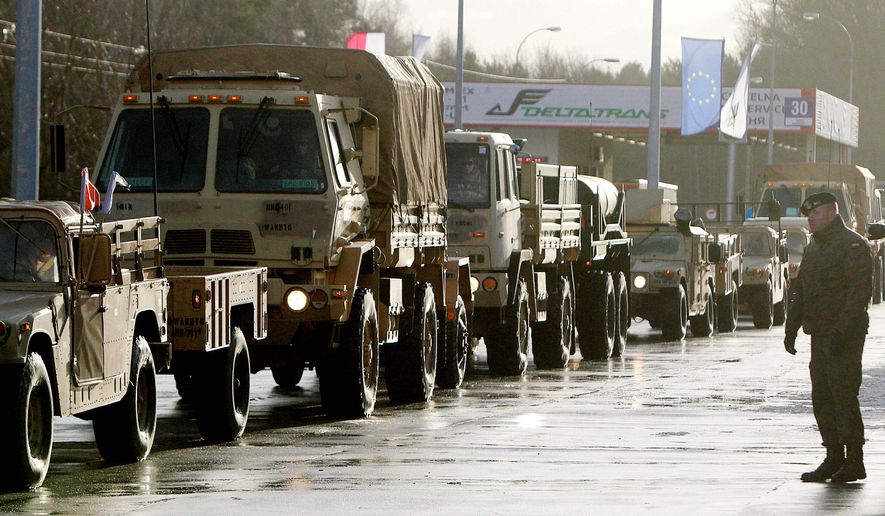- Joined
- Dec 6, 2010
- Messages
- 33,427
- Reaction score
- 5,689
East Germans protest US military movements outside Berlin
By Ben Knight | May 30, 2018

By Ben Knight | May 30, 2018

Some 2,050 US military vehicles, in 102 convoys, are currently rumbling through the flat, sleepy country roads in the eastern German state of Brandenburg on their way to Poland. On Monday, they faced token opposition at their stop at a German military barracks near the small town of Brück, from a protest organized by the Left party and attended by a handful of communists and peace activists.
The troop movements, which will likely inconvenience a few motorists until mid-June, are part of the vast and indefinite NATO operation Atlantic Resolve, which is meant to reinforce the alliance's borders in eastern Europe.
While the military purpose of this exercise is uncertain, given that Russian forces across the border are much larger, Atlantic Resolve is considered a vital political signal of NATO's commitment to its smaller members in the east. Atlantic Resolve, which involves the complete rotation of troops every nine months, was launched in diect response to Russia's annexation of Crimea and the war in Donbass in 2014.
Eastern German skepticism
The US Army is aware this part of their journey might be potentially prickly — particularly in eastern Germany where some are still sensitive about seeing a massive US presence on their doorsteps. "Our aim is absolute transparency," the operation commander, Col. William S. Galbraith, said at a mid-May press conference, called in conjunction with the German military. "We're practicing, for example, how troop movements could be conducted in an emergency."
But Brandenburg's state premier, Dietmar Woidke, of the Social Democratic Party, signaled some consternation earlier this year when he was quoted in the press as saying, "I think that it doesn't help us in the long run if tanks drive up and down both sides of the border."
On Monday, Brandenburg government spokesman Florian Engels offered a more diplomatic statement. "The Brandenburg state government fundamentally has a clear commitment to NATO and the alliance's responsibilities," he told DW in an email. "But we need more dialogue with Moscow. That is the right path."
Still, one of Woidke's Cabinet members, Labor and Social Affairs Minister Diana Golze of the socialist Left party, joined her party's small but noisy demonstration on Monday in Brück. The protest attracted a group of around 50 people, representing a mix of leftist organizations — some considerably further left than the Left party, such as the German Communist Party (DKP) — as well as a few inhabitants of the surrounding eastern German towns.
'The Russians never meant us any harm'

Some protesters weren't afraid to deploy the mildly pejorative German term for Americans
"We called this demonstration because we don't want to get used to these exercises here in Brandenburg. We didn't want them just to pass by without any opposition," Golze told DW. "We think this isn't a good time for the relocation of troops to the border between Poland and Russia. We need to think about how to get out of this spiral of violent escalation. There needs to be a diplomatic path, and not just saber-rattling."
Waltraud Plarre, an economist from nearby Lehnin, explained Germans' conflicted feelings about Russia - the current anger against NATO is imbued with Cold War-era suspicions. For many who grew up in communist German Democratic Republic, the USSR is chiefly remembered as the power that liberated Germany from Nazism.
"The feeling that many West Germans don't understand is that the East Germans say: The Russians never did us any harm," she said, holding a banner that read "Amis go home," using the mildly pejorative German term for Americans. "We never experienced the Russians having evil intentions. And now trying to stir us all up against each other is not in the interests of German people — neither the people in the west or the east. There are other powers behind this that want us to fight each other."
But those feelings weren't exactly shared by the immediate locals living in the communist-era housing blocks next to the protest. A handful had brought plastic chairs out into the sun to watch, equal parts amusement and irritation, as the leftists made speeches and sang songs. It made a change from the multinational military transports rolling past their doorsteps and the artillery fire from the Bundeswehr barracks, which they'd long since grown used to.
"I'm more bothered by the protest, to be honest," one woman said as the distant gunfire was partially drowned out by an amplified acoustic set by a young folk singer beneath a giant image of a dove. "What's the point of all this? For me, Putin is a threat. If he's such a nice guy how come he used to be in the KGB?"
Modest protest
It was clear that the handful of police officers, lounging inside a couple of cruisers at a distance, considered the event fairly modest — and as it petered out after barely 90 minutes, some demonstrators grew annoyed with what they considered the Left party's half-hearted mobilization efforts.
"Where are they all? They had one bus, for 15 people!" complained Falko Hartmann bitterly. "There are more people here from the peace movement than from the Left party."
Hartmann, part of a charity that helps victims of the war in Donbass, considers Kyiv the aggressors in the Ukraine conflict. "We've been there under fire ourselves and we know where the grenades come from," he told DW. "Of course, neither side is doing everything right, but the biggest provocations are clearly coming from the Ukrainian side."
Then he looked around at the rapidly emptying field behind him. "I'm here to stop the madness of American soldiers being sent to the Russian border, but apparently hardly anyone is interested around here," he said. "This was pure PR. We'll never get anything done this way."
http://www.dw.com/en/germans-protest-us-military-movements-outside-berlin/a-43990723






